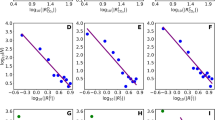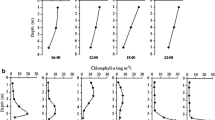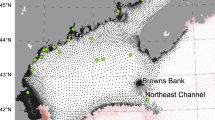Abstract
Arising from D. G. Boyce, M. R. Lewis & B. Worm Nature 466, 591–596 (2010)10.1038/nature09268; Boyce et al. reply
Phytoplankton account for about half of global and nearly all of marine primary productivity; consequently, any widespread drop in phytoplankton biomass would almost certainly have severe ecological consequences. Boyce et al.1 have reported strong (∼1% per year) and sustained declines in marine phytoplankton biomass at local, regional and global scales. However, I suggest that some or much of their reported declines are attributable to bias between the two data types used by Boyce et al.1. Although real changes may have occurred, their proper quantification requires removal of the bias component.

Similar content being viewed by others
References
Boyce, D. G., Lewis, M. R. & Worm, B. Global phytoplankton decline over the past century. Nature 466, 591–596 (2010)
Siegel, D. A. & Franz, B. A. Century of phytoplankton change. Nature 466, 569–571 (2010)
Falkowski, P. & Wilson, C. Phytoplankton productivity in the North Pacific ocean since 1900 and implications for absorption of anthropogenic CO2 . Nature 358, 741–743 (1992)
Author information
Authors and Affiliations
Corresponding author
Ethics declarations
Competing interests
The author declares no competing financial interests.
PowerPoint slides
Rights and permissions
About this article
Cite this article
Mackas, D. Does blending of chlorophyll data bias temporal trend?. Nature 472, E4–E5 (2011). https://doi.org/10.1038/nature09951
Received:
Accepted:
Published:
Issue Date:
DOI: https://doi.org/10.1038/nature09951
- Springer Nature Limited
This article is cited by
-
Scientists’ warning to humanity: microorganisms and climate change
Nature Reviews Microbiology (2019)
-
Boyce et al. reply
Nature (2011)





